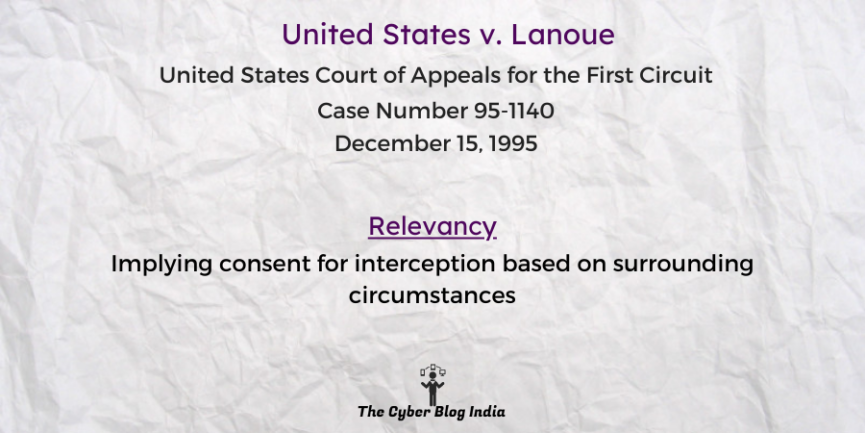United States v. Lanoue

United States v. Lanoue
71 F.3d 966
In the United States Court of Appeals for the First Circuit
Case Number 95-1140
Before Chief Judge Torruella, Senior Circuit Judge Bownes and Circuit Judge Stahl
Decided on December 15, 1995
Relevancy of the case: Implying consent for interception based on surrounding circumstances
Statutes and Provisions Involved
- The Federal Wiretapping Statute §§ 2510-2522
- The Federal Rule of Criminal Procedure (Rule 16)
Relevant Facts of the Case
- The trial court had convicted and sentenced the defendant for interstate transportation of a stolen motor vehicle, firearm with an obliterated serial number and conspiracy to commit federal offences.
- The government had conducted vast land and air surveillance on the defendant with the help of 14 FBI agents. They learned that the defendant, with his accomplices, had stolen a 1986 Oldsmobile Firenza. Thereafter, they used it to commit the robbery of an armoured car courier.
- On December 19, 1993, the defendant and his accomplice brought the Oldsmobile to a farm to get its front end repaired. Further, American International Leasing reported on December 21 that the Oldsmobile had been stolen.
- After taking the car from the farm, the defendant and his accomplice took it to Ames Plaza, where the defendant got arrested.
- The defendant admitted to a recorded telephone call that Carron made from the Wyatt Detention Center while awaiting trial. He did not receive notice that even approached these standards. His counsel had contended that deficient notice will almost always defeat a claim of implied consent.
Prominent Arguments by the Counsels
- The defendant’s counsel argued that:
- Laraviere had provided false information to the government and submitted that the defendant bought the 1986 Oldsmobile Firenza from Lararviere. Further, he submitted that Carron had witnessed this.
- Moreover, the informant has falsely informed the FBI agents for favourable treatment on the pending theft charges against him.
- The government did not testify to the informant. The government believed the informant because the defendant was not found guilty in the 1991 case, which was tried by the same prosecutor.
- Moreover, the government has violated the Federal Rule of Criminal Procedure by recording their conversation. Hence, he argued that the trial court’s discretion should be declared a mistrial.
- The appellee’s counsel submitted that the government recorded the conversation in good faith and did not produce it in court because it believed the recording was not pertinent.
Opinion of the Bench
- The prosecutor had made an error in good faith and relied on his reasonable legal arguments.
- The government’s discovery violation did not undermine the purposes of Rule 16 because it did not cause the defendant to unknowingly subject himself to impeachment.
- The court vacated the District Court’s order for Counts I and V and remanded for a new trial. However, it continued with the given sentence for Count VI.
Final Decision
- The court did not set aside his conviction for Count VI.
